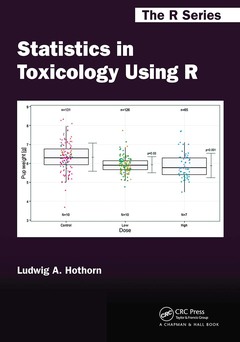Statistics in Toxicology Using R Chapman & Hall/CRC The R Series

The apparent contradiction between statistical significance and biological relevance has diminished the value of statistical methods as a whole in toxicology. Moreover, recommendations for statistical analysis are imprecise in most toxicological guidelines. Addressing these dilemmas, Statistics in Toxicology Using R explains the statistical analysis of selected experimental data in toxicology and presents assay-specific suggestions, such as for the in vitro micronucleus assay.
Mostly focusing on hypothesis testing, the book covers standardized bioassays for chemicals, drugs, and environmental pollutants. It is organized according to selected toxicological assays, including:
- Short-term repeated toxicity studies
- Long-term carcinogenicity assays
- Studies on reproductive toxicity
- Mutagenicity assays
- Toxicokinetic studies
The book also discusses proof of safety (particularly in ecotoxicological assays), toxicogenomics, the analysis of interlaboratory studies and the modeling of dose-response relationships for risk assessment. For each toxicological problem, the author describes the statistics involved, matching data example, R code, and outcomes and their interpretation. This approach allows you to select a certain bioassay, identify the specific data structure, run the R code with the data example, understand the test outcome and interpretation, and replace the data set with your own data and run again.
Principles. Simultaneous comparisons versus a negative control. Evaluation of long-term carcinogenicity assays. Evaluation of mutagenicity assays. Evaluation of reproductive toxicity assays. Ecotoxicology: Test on significant toxicity. Modeling of dose-response relationships. Further methods. Conclusions. Appendix.
Ludwig A. Hothorn is a professor in the Institute of Biostatistics at the Leibniz University of Hannover. Dr. Hothorn has published more than 130 papers in peer-reviewed journals and contributed numerous book chapters. His research interests include computational statistics using R as well as the application of statistical methods in biology, agriculture, medicine, life sciences, toxicology, pharmacology, and quantitative genetics.
Date de parution : 06-2021
17.8x25.4 cm
Date de parution : 01-2016
17.8x25.4 cm
Thèmes de Statistics in Toxicology Using R :
Mots-clés :
FWER; Simultaneous Confidence Interval; confidence; Lower Confidence Limits; interval; Trend Test; simultaneous; Mosaic Plot; intervals; Repeated Toxicity Studies; lower; Dunnett Procedure; limits; Benchmark Dose; trend; Contrast C1; tests; Cell Transformation Assay; mosaic; Tumor Rates; plot; Williams Procedure; LLNA; Downturn Effects; Mixed Effects Model; GAMLSS RS Iteration; Micronucleus Assay; Mosapride Citrate; Simultaneous Confidence; 3PL Model; Relative Organ Weights; Pup Weight; Parametric Non-linear Models; Vivo Micronucleus Assay; Body Weight Retardation



